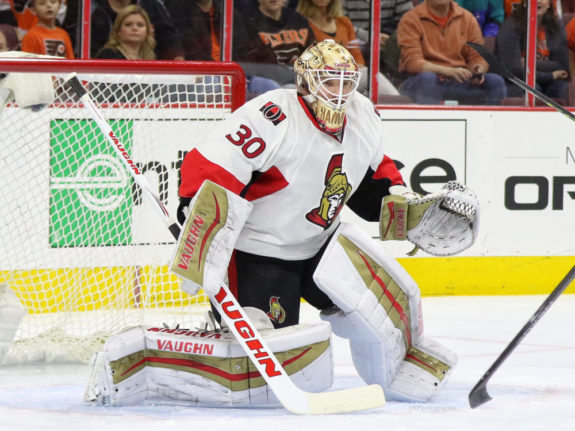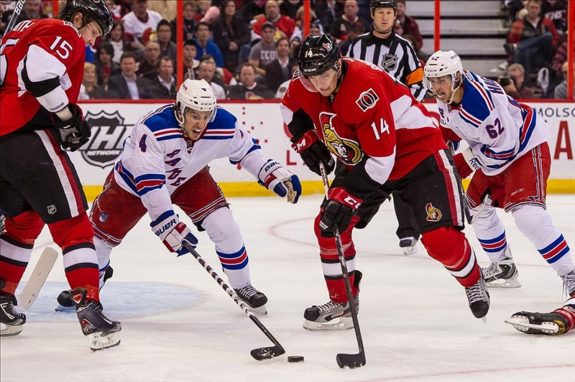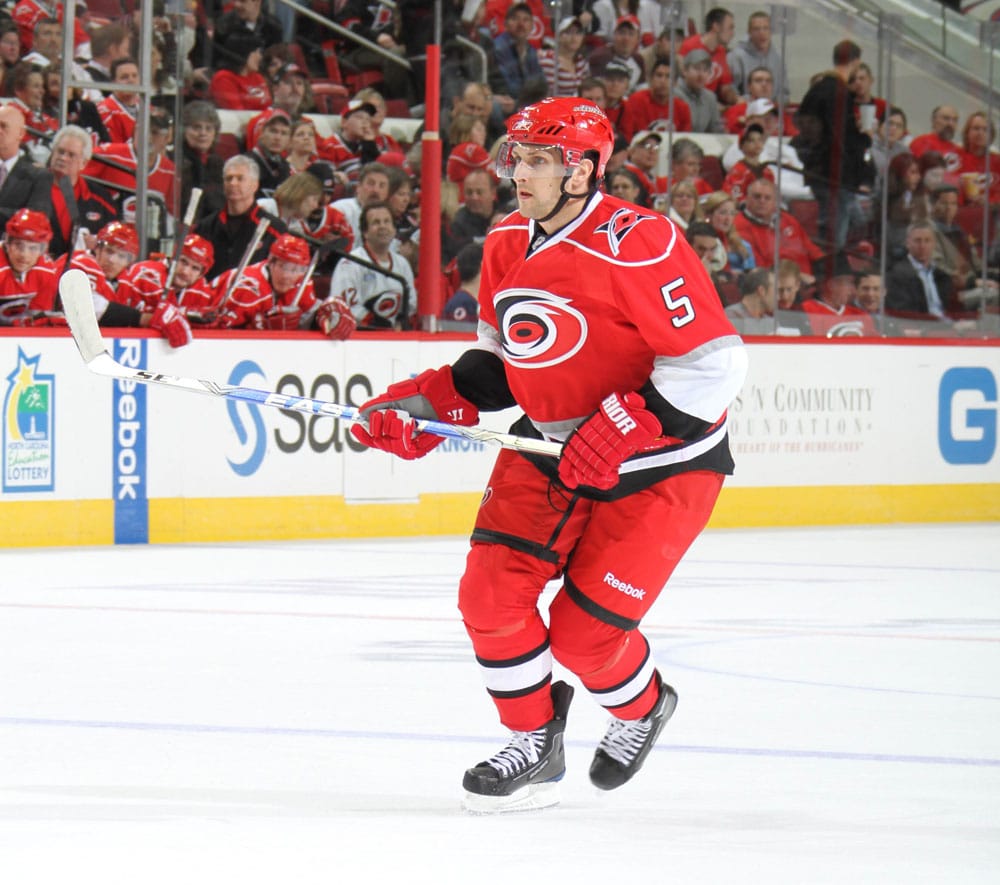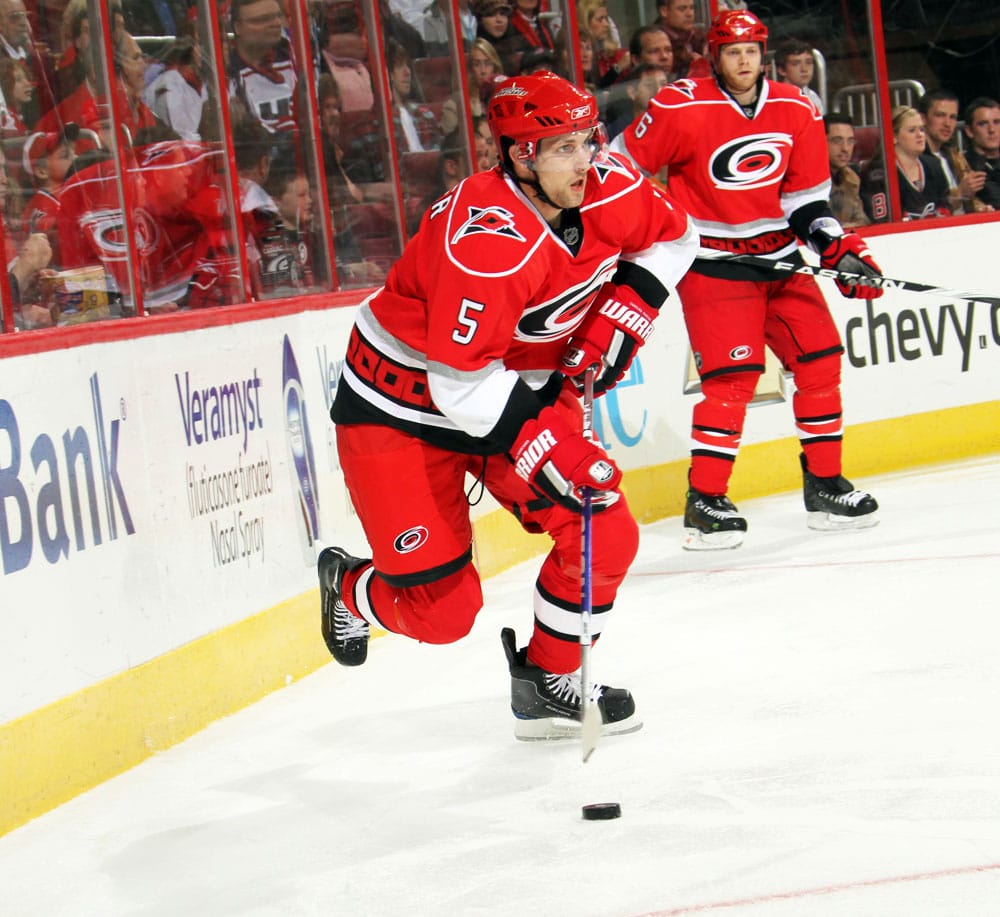When players show massive improvement over the course of one season and produce like they never had before, the signs usually point to a breakthrough in their development. However, sometimes the career-high season merely represents a flash in the pan, and the fire dissipates soon after. In the case of the Ottawa Senators, a handful of players share these traits. Three Senators come to mind, who after making a name for themselves after one season, never reached the same level of play again.
Andrew Hammond
It’s incredibly rare for NHL goalies to ride a hot streak for their entire careers. Andrew Hammond is a prime example of a player who rode a flash in the pan, before falling off the face of the earth. He played his amateur career in the British Columbia Hockey League (BCHL) and Pacific Junior Hockey League before spending a four-year career at Bowling Green University in the NCAA. While at school, he was the winner of the Falcons’ MVP award in 2011 and 2012. It was in Ohio where the nickname “Hamburgler” got its origin and the name stuck with him through his pro career as well.

Ottawa signed Hammond as an undrafted free agent in March of 2013, where he was immediately sent to the Senators’ AHL affiliate in Binghamton. What made his case unique was that he wasn’t impressive in the minors, with a combined goals against average (GAA) over 3.00 during his two seasons. He was called up to Ottawa in 2014 and made his debut in relief of Robin Lehner, making 11 saves over 35 minutes of play. In the 2014-15 season, he was called up due to necessity after an injury to goaltender Craig Anderson and went on one of the greatest single-season runs in NHL history.
Related: Senators’ 3rd and 5th Are Best, but 1st Overall Would Be Good, Too
From his first NHL start on Feb. 18, 2015, to his last of the season on April 11, Hammond compiled a record of 20-1-2, combined with a 1.79 GAA, and a save percentage (SV%) of 0.941. This was good enough for a top-15 finish in the voting for the Hart Trophy and seventh in voting for the Vezina Trophy. However, in the playoffs he showed signs of what he truly was.
In the first round of the playoffs that season, the Senators went up against the Montreal Canadiens, and while Anderson was healthy again, the net was Hammond’s to lose. He wasn’t a terrible goalie that playoffs, but after the Senators went down 2-0 in the series, with some questionable goals against in the second game, Anderson got his net back in Game 3. It was the beginning of the end for Hammond, but not before he got a contract extension from the team for three years.
Related: AHL Central News: Hammond Puts Wild on His Back
Beginning the 2015-16 season as the backup to Anderson, Hammond was not nearly the same goalie as advertised the previous season, as he regressed hard. Over 21 starts, his record fell to 7-11-4, with a 0.914 SV% and a 2.65 GAA. For a backup, these numbers aren’t terrible, but it goes to show what a flash in the pan can do to a player’s perceived value. The 2016-17 season was his last in Ottawa, after starting only four games in the NHL before being sent back to the AHL. It was in the minors where he was dealt a season-ending injury with a tear in his right labrum.
The following season, Hammond was traded to the Colorado Avalanche as a part of the Matt Duchene deal. He only made two appearances for the team in the regular season, and three in the playoffs. Even though he was impressive in his limited appearances, the Avalanche did not re-sign him. After a one-season stint for the Minnesota Wild’s AHL team, he signed a new contract with the Buffalo Sabres on July 1, 2019.
Colin Greening
The 2005 Draft was one of the best in the history of the league, but when the dust settled, the Senators only drafted three regular NHL players. One of which was the 204th-overall pick, Colin Greening. It took time for him to reach the NHL, as he spent time in the BCHL and four full seasons at Cornell University in the NCAA. By the time he made his debut in the 2010-11 season, he was already 24 years old. In his limited action he showed some promise, recording 15 points in 24 games. His first full season in 2011-12 turned out to be the peak of his ability.

In a full 82-game season, Greening had a breakout year, scoring 17 goals and 28 assists. His 37 points were sixth on a Senators team that scored the fourth-most goals in the NHL that season. However, through a string of possible bad luck, and some injury problems, he never came close to another season like this one.
The 2012-13 season, shortened due to the lockout, saw Greening score 19 points over 47 games, which over a full season put him on pace for 33 points. A small regression, but nothing to seriously be concerned about. He played well enough to receive a contract extension in September for three seasons that was worth $7,950,000.
The 2013-14 season is where Greening’s lack of development became a problem. In 78 games, he only recorded 17 points, cutting his points-per-game rate nearly in half. At this point, the now 27-year-old forward was trending towards a downward spiral, and the 2014-15 season made Ottawa realize that they needed to cut him loose.
In 26 games during the season, Greening scored only one goal and had zero assists. In the second year of his contract that paid him more than $2 million per season, his lack of production became a serious problem. In February of 2016, he was traded to the Toronto Maple Leafs in the huge trade that brought Dion Phaneuf to Ottawa.
Related: Senators’ All-Time One and Done Skaters
After 30 games and 15 points as a Maple Leaf, Greening spent the remainder of his career with the Toronto Marlies in the AHL. He retired in 2019 to pursue a degree at Harvard University.
Brian Pothier
If you are going to have a flash in the pan season, you may as well do it in a contract year. That is exactly what former Senators defenseman Brian Pothier did in 2005-06. The Sens acquired the American-born defender from the Atlanta Thrashers on June 29, 2002, the trade that sent Shawn McEachern away. The 24-year-old had split time between the Thrashers and their AHL and IHL affiliates. He played well in the minors but had yet to make a consistent impact in the NHL. For the first two seasons of his Ottawa career, it was more of the same. When the 2005-06 season began and his contract was set to expire on July 1, he found his game.

As the Senators had their best regular season in franchise history, so did Pothier. Up until this point, he had recorded 14 points in his 69 total games as a Senator. In 2005-06, he played 77 games while putting up 35 points, good enough for 10th in team scoring. On a team that featured Dany Heatley, Jason Spezza, Daniel Alfredsson, Zdeno Chara, and Wade Redden, even being mentioned in the top scorers is a massive accomplishment.
Related: NHL Fans & NHL Players: A Special Bond
It is worth mentioning that Pothier’s stats were likely inflated due to his teammates, and he was on the third pairing. With the Senators already having to choose between Redden and Chara, they didn’t have the cap room to sign him. The Washington Capitals didn’t think this was an issue, and signed him to a four-year, $10 million deal on July 1, 2006.

Aside from a decent 2006-07 season, Pothier never was able to replicate his career year. He spent three and a half seasons with the Capitals before being traded to the Carolina Hurricanes in March of 2010 as a part of the package to acquire Joe Corvo. When the 2009-10 season ended, Pothier left the NHL and signed with HC Geneve in the Swiss National League where he played for the remainder of his professional career. He retired in 2012 due to concussion-related symptoms.
Related: The Issues Facing Women’s Hockey in 2020-21
Now, Pothier works for USA Hockey as a coach for the Women’s National Team. He also runs his own hockey school in his hometown of New Bedford, Massachusetts.
One Year Wonders
What all of these players have in common is one outlier season that artificially inflated their value. The timing of their career years also couldn’t have been timed better, as all three gained contracts that far outvalued their on-ice ability. Luckily for the Senators, none of these contracts were albatrosses that handicapped them. It just goes to show that one good season is not always indicative of a player’s whole career.